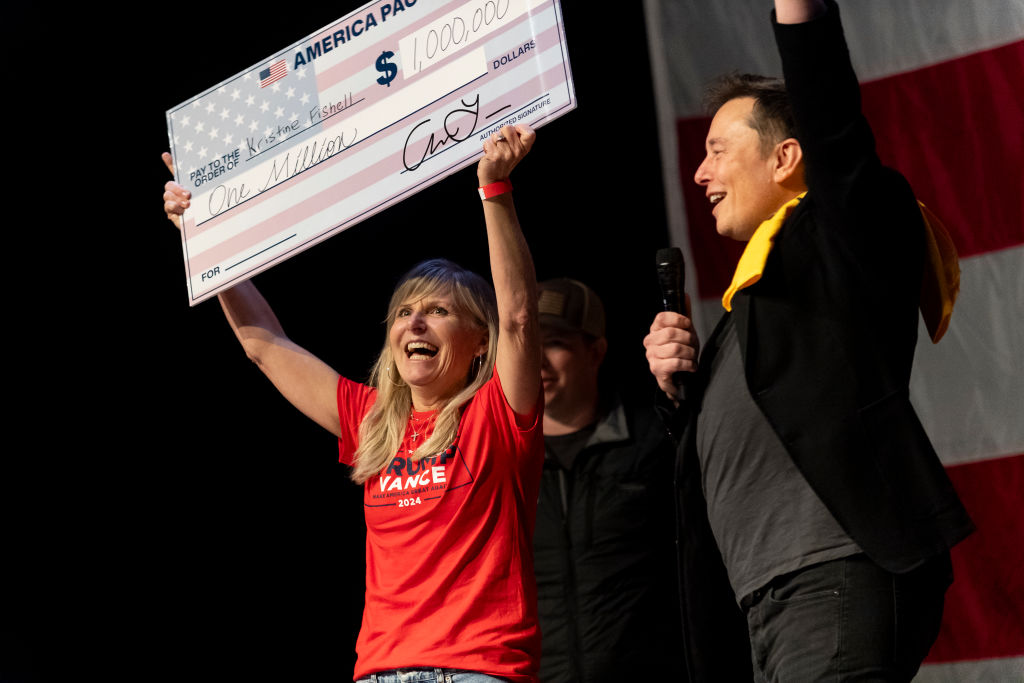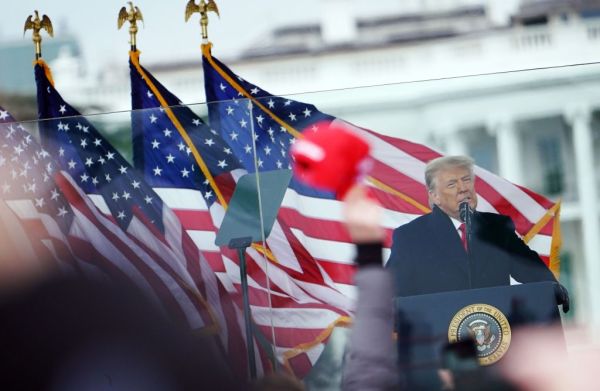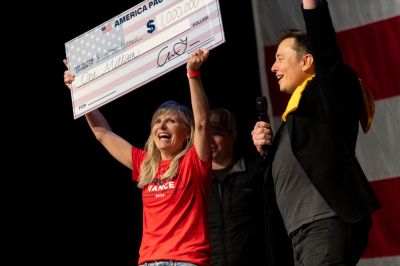For the better part of 24 hours, from October 20 well into October 21, the trend-pushing “What’s Happening” list at Elon Musk’s X social media platform promoted the term “Zuckerberg.” But Facebook founder Mark Zuckerberg had done nothing special that day to make big news. Rather, a chorus of Musk allies was pounding away in unison at a single theme: A scheme to pay prospective new voters in battleground state Pennsylvania that had just brought Musk under fire was no worse than—and maybe not nearly as sinister as—what Zuckerberg had done four years ago in the 2020 election.
“Just a reminder that Mark Zuckerberg spent $400 million on the 2020 election. They had no problem with big tech influence on the election until Elon backed Trump,” wrote right-wing podcaster Clint Russell, in a tweet shared 10,000 times. “When Mark Zuckerberg gives $400+ million to Democrats, this is democracy at work. When @elonmusk uses his rights as a citizen to support his preferred political candidate, this cannot be tolerated,” proclaimed Gad Saad, a professor in Canada with 1 million followers on X. And so the same talking point worked its way down the food chain of MAGA influencers.
Here’s a catch-up for those who may have drowsed through the supposed scandal four years back. Zuckerberg did nothing illegal in the 2020 election. Together with his wife, Priscilla Chan, he provided philanthropic grants to local election offices around the country, a program sometimes nicknamed Zuckerbucks, to cope with disruptions arising from the COVID pandemic. The grants assisted with emergency needs ranging from changes in voting methods and staff training to helping with voter outreach and the management of wait lines.
Contrary to Saad’s claim that Zuckerberg “[gave] $400+ million to Democrats,” these grants were offered to offices in red and blue, swing and non-swing areas alike, and they did not go to candidates or parties. By contrast, Musk’s scheme to pay voters is limited to swing states and blatantly designed to help one particular candidate. (Neither Russell’s nor Saad’s tweet has drawn a Community Note, X’s program to flag misinformation.)
Meanwhile, Musk’s plan to use raw cash outlays to boost Trump vote totals has two main branches, each of doubtful legality. The first provided that Musk would pay $100 to each Pennsylvanian who signed a petition, and another $100 for each signature referred—the key condition being that both individuals had to be registered to vote in Pennsylvania. Slightly different terms applied for signers in six other swing states, and no inducements at all were offered to voters in the other 43 states.
Among its other content, the petition pledged the signer to support Second Amendment gun rights, efficiently screening out many prospects who might be supporters of Kamala Harris. It also was drafted to expire at midnight October 21, when Pennsylvania closed voter registration—highly consistent with the view that it was meant to drive new voter registrations.
The legal problem here, as UCLA law professor Rick Hasen soon pointed out, is that “federal law has long prohibited providing payments or making expenditures to induce voting, whether or not those inducements are limited to those who might vote for a particular candidate.” As with payments to vote, both the giver and the recipient of a payment to induce registration are violating federal law, subject to some exceptions unlikely to apply here. Hasen quotes the Department of Justice’s election crimes manual, which explains the rationale for the prohibition, that “those who choose to vote have a right not to have the voting process diluted with ballots that have been procured through bribery; and that the selection of the nation’s leaders should not degenerate into a spending contest, with the victor being the candidate who can pay the most voters.”
The second branch of the program emerged a few days later, on October 19, when Musk announced that he would award a $1 million prize each day to a randomly selected signer of the petition, who by definition had to be a registered voter, and that he would start the giveaway that very evening. Along with all the previous objections, as Hasen pointed out, the DOJ election crimes manual specifically names lottery chances as a prohibited inducement for registration. Like other states, Pennsylvania also imposes extensive prohibitions and regulations on private operation of lotteries, whether or not election-related.
How likely is it, do you think, that someone looking at Musk’s actions would say to themselves, “You know, this is just like what Mark Zuckerberg was trying to do in 2020”?
Four years later, the imagined “Zuckerbucks” scandal has gotten embedded in Stop the Steal mythology as one of the ways liberals supposedly rigged the election that year. Although they never uncovered the kind of wrongdoing they may have expected, the more respectable argument runs like this: Even though the grants may have been offered to election offices across the board, cities and counties that were larger (and hence more Democratic leaning) were more likely to actually accept the help. Moreover, some of the public functions assisted by the grants, such as voter outreach, may serve to boost turnout, and (so the argument goes) Democrats are known to benefit from higher turnout, so the program was not quite so neutral after all.
There is no evidence, however, that the program changed any outcomes. In Wisconsin, one of the states with the narrowest voting margins in 2020, a study by the right-of-center Wisconsin Institute of Law and Liberty estimated that any added turnout, if even measurable, would not have been enough to swing the election. (In addition, as a legal matter, courts will uphold otherwise lawfully cast votes even if they were encouraged by a voter turnout effort that broke some rule.)
Given the hype, it all came as an anticlimax when the Federal Election Commission (FEC) unanimously rejected a complaint that the grants should be construed as improper donations meant to influence an election. That’s significant, because the division of the six-member FEC between three Democratic and three Republican appointees regularly results in even splits on issues that divide experienced party lawyers. This wasn’t one.
The Justice Department has reportedly sent Musk’s group a letter warning that the sweepstakes stunt may violate federal law. Given its timing, it is unlikely that we will get a definitive ruling on its legality until after the election. Musk should only hope that he comes out with as clean a bill of legal health as did Mark Zuckerberg.





Please note that we at The Dispatch hold ourselves, our work, and our commenters to a higher standard than other places on the internet. We welcome comments that foster genuine debate or discussion—including comments critical of us or our work—but responses that include ad hominem attacks on fellow Dispatch members or are intended to stoke fear and anger may be moderated.
With your membership, you only have the ability to comment on The Morning Dispatch articles. Consider upgrading to join the conversation everywhere.